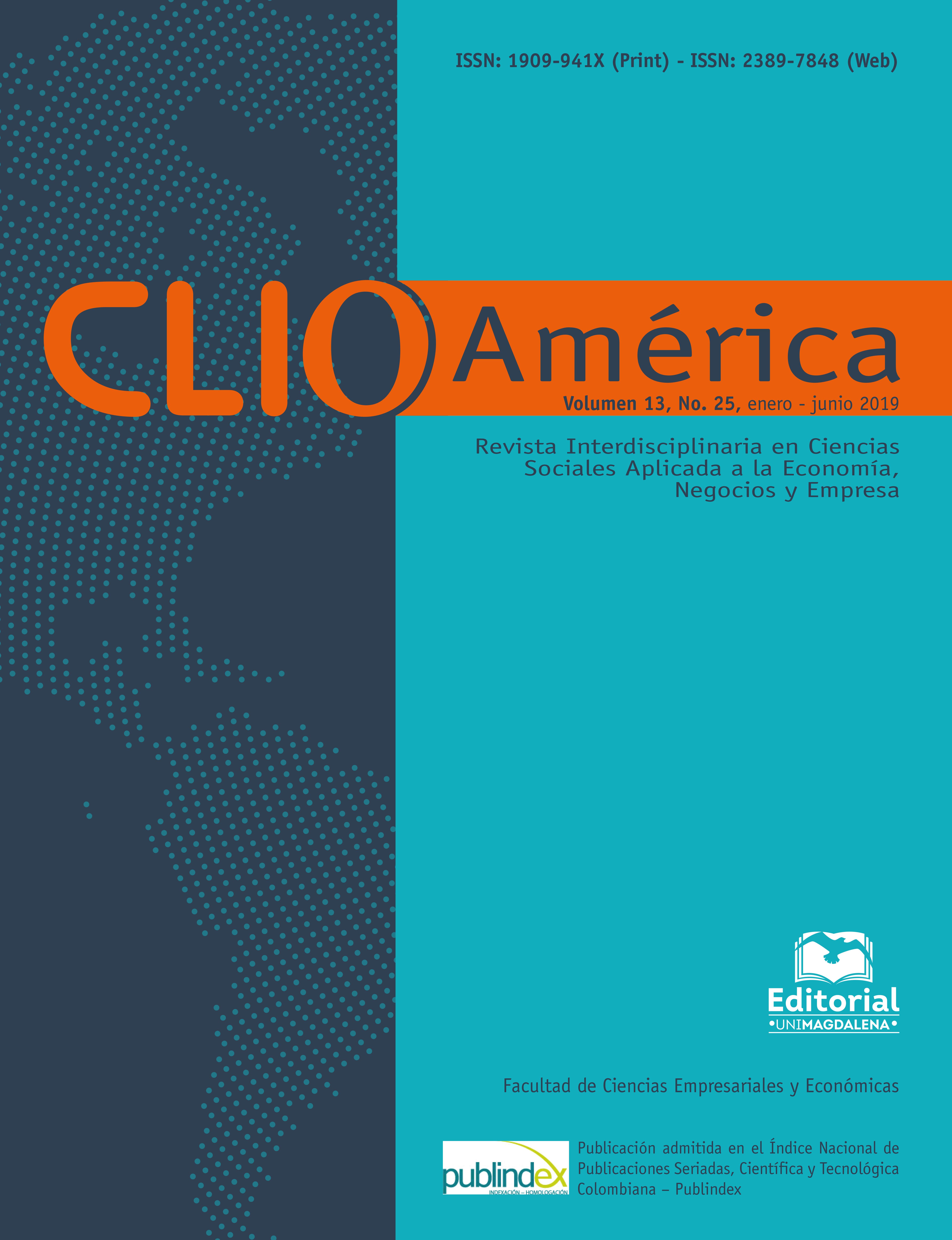¿Incide la ISO 14000 en el desempeño exportador de las empresas colombianas?
Contenido principal del artículo
Resumen
Descargas
Detalles del artículo

Esta obra está bajo una licencia internacional Creative Commons Atribución-NoComercial-CompartirIgual 4.0.
Esta revista proporciona un acceso abierto a su contenido, basado en el principio de ofrecer al público un acceso libre a las investigaciones ayuda a un mayor intercambio global del conocimiento. De igual forma su versión impresa es de libre acceso y no tiene costos asociados por publicación.
Citas
Aguilera-Caracuel, J., Hurtado-Torres, N. E. y Aragón-Correa, J. A. (2012). Does international experience help firms to be green? A knowledge-based view of how international experience and organizational learning influence proactive environmental strategies. International Business Review, 21(5), 847-861. doi: https://doi.org/10.1016/j.ibusrev.2011.09.009
Antonietti, R. y Marzucchi, A. (2014). Green tangible investment strategies and export performance: a firm-level investigation. Ecological Economics, 108, 150-161. doi: https://doi.org/10.1016/j.ecolecon.2014.10.017
Banco de la República. (2018). Flujo de Inversión Extranjera Directa según país de destino. Recuperado de http://www.banrep.gov.co/es/inversion-directa
Bellesi, F., Lehrer, D. y Tal, A. (2005). Comparative Advantage: The Impact of ISO 14001 Environmental Certification on Exports. Environ. Sci. Technol., 39(7), 1943-1953. doi: https://doi.org/https://doi.org/10.1021/es0497983
Clarkson, P., Li, Y., Richardson, G. y Vasvari, F. P. (2011). Does it really pay to be green? Determinants and consequences of proactive environmental strategies. Journal of Accounting and Public Policy, 30(2), 122-144. Recuperado de https://econpapers.repec.org/article/eeejappol/v_3a30_3ay_3a_3ai_3a2_3ap_3a122-144.htm
Chen, P. H., Ong, C. F. y Hsu, S. C. (2016). Understanding the relationships between environmental management practices and financial performances of multinational construction firms. Journal of Cleaner Production, 139, 750-750. doi: https://doi.org/10.1016/j.jclepro.2016.08.109
Dragičević, M. y Letunić, S. (2012). The influence of international standards ISO 9001 and ISO 14001 on marketing performances of Croatian hotels. Tourism & Hospitality Management, Conference Proceedings, 22(1), 102-110. Recuperado de https://www.daaam.info/Downloads/Pdfs/proceedings/proceedings_2011/0265_Dragicevic.pdf
Feng, T., Cai, D., Wang, D. y Zhang, X. (2016). Environmental management systems and financial performance: the joint effect of switching cost and competitive intensity. Journal of cleaner production, 113, 781-791. doi: https://doi.org/10.1016/j.jclepro.2015.11.038
González-Benito, J. y González-Benito, O. (2006). A review of determinant factors of environmental proactivity. Business Strategy and the Environment, 15(2), 87-102. doi: https://doi.org/10.1002/bse.450
González, P., Sarkis, J. y Adenso‐Díaz, B. (2008). Environmental management system certification and its influence on corporate practices: Evidence from the automotive industry. International Journal of Operations & Production Management, 28(11), 1021-1041. doi: https://doi.org/10.1108/01443570810910179
Jänicke, M. (2008). Ecological modernization: new perspectives. Journal of Cleaner Production, 16(5), 557-565. doi: https://doi.org/10.1016/j.jclepro.2007.02.011
King, A., Lenox, M. y Terlaak, A. (2005). The strategic use of decentralized institutions: Exploring certification with the ISO 14001 management standard. Academy of Management Journal, 48(6), 1091-1106. doi: https://doi.org/10.5465/amj.2005.19573111
Leonidou, C. L., Fotiadis, T. A., Christodoulides, P., Spyropoulou, S. y Katsikeas, C. S. (2015). Environmentally friendly export business strategy: Its determinants and effects on competitive advantage and performance. International Business Review, 24(5), 798-811. doi: https://doi.org/10.1016/j.ibusrev.2015.02.001
Lo, C. K., Yeung, A. C. y Cheng, T. C. (2012). The impact of environmental management systems on financial performance in fashion and textiles industries. International Journal Production Economics, Elsevier, 135(2), 561-567. Recuperado de https://ideas.repec.org/a/eee/proeco/v135y2012i2p561-567.html
Lucas, M. T. y Noordewier, T. G. (2016). Environmental management practices and firm financial performance: The moderating effect of industry pollution-related factors. International Journal Production Economics, Elsevier, 175, 24-34. doi: https://doi.org/10.1016/j.ijpe.2016.02.003
Luan, C. J., Tien, C. y Chen, W. L. (2016). Which “green” is better? An empirical study of the impact of green activities on firm performance. Asia Pacific Management Review, 21(2), 102-110. doi: https://doi.org/10.1016/j.apmrv.2015.12.001
Martín-Tapia, I., Aragón-Correa, J. y Senise-Barrio, M. (2008). Being green and export intensity of SMEs: The moderatinginfluence of perceived uncertainty. Ecological Economics, Elsevier, 68(1-2), 56-67. doi: https://doi.org/10.1016/j.ecolecon.2008.01.032
Miles, M. P., Munilla., S. L. y McClurg, T. (1999). The impact of the ISO 14000 environmental management standards on small and medium sized enterprises. Journal of Quality Management, 4(1), 111-122. doi: https://doi.org/10.1016/S1084-8568(99)80098-4
Miroshnychenko, I., Barontini, R. y Testa, F. (2017). Green practices and financial performance: A global outlook. Journal of Cleaner Production, 147, 340-351. doi: https://doi.org/10.1016/j.jclepro.2017.01.058
Neves, F. O., Salgado, E. y Beijo, L. (2017). Analysis of the Environmental Management System based on ISO 14001 on the American continent. Journal of Environmental Management, 199, 251-262. doi: https://doi.org/10.1016/j.jenvman.2017.05.049
Oliveira, O. J., Serra, J. R. y Salgado, M. (2010). Does ISO 14001 work in Brazil? Journal of Cleaner Production, 18(18), 1797-1806. doi: https://doi.org/10.1016/j.jclepro.2010.08.004
Organización Internacional para la Estandarización - ISO. (2018). When the world agrees. Recuperado de https://www.iso.org/files/live/sites/isoorg/files/store/en/PUB100007.pdf
Organización Internacional para la Estandarización - ISO. (2016). The ISO Survey of Management System Standard Certifications (1999-2016). Recuperado de https://isotc.iso.org/livelink/livelink?func=ll&objId=18808772&objAction=browse&viewType=1
Pekovic, S. y Rolland, S. (2016). Quality standards and export activities: Do firm size and market destination matter? Journal of High Technology Management Research, 27, 110-118. doi: https://doi.org/10.1016/j.hitech.2016.10.002
Porter, M. y Van der Linde, C. (1995). Toward a new conception of the environment-competitiveness relationship. The Journal of the Economic Perspectives, 9(4), 97-118. doi: http://dx.doi.org/10.1257/jep.9.4.97
Psomas, E., Fotopoulos, C. y Kafetzopoulos, D. (2011). Motives, difficulties and benefits in implementing the ISO 14001 Environmental Management System. Management of Environmental Quality: An International Journal, 22(4), 502-521. doi: https://doi.org/10.1108/14777831111136090
Rothery, B. (1995). Why ISO 14000 will catch ISO 9000. Manufacturing Engineering, 115(5), 128.
Rowland-Jones, R., Pryde, M. y Cresser, M., (2005). An evaluation of current environmental management systems as indicators of environmental performance. Management of Environmental Quality: An International Journal, 16(3), 211-219. doi: https://doi.org/10.1108/14777830510591642
Seijo-García, M., Filgueira-Vizoso, A. y Muñoz-Camacho, E. (2013). Consecuencias positivas de la implantación de la certificación ISO 14001 en las empresas Gallegas (España). Dyna, 80(177), 13-21. Recuperado de https://revistas.unal.edu.co/index.php/dyna/article/view/34035
Tambunlertchai, K., Kontoleon, A. y Khanna, M. (2013). Assessing Participation in Voluntary Environmental Programmes in the Developing World: The Role of FDI and Export Orientation on ISO14001 Adoption in Thailand. Applied Economics, 45(15), 2039-2048. doi: https://doi.org/10.1080/00036846.2011.648320
Wysokińska, Z. y Witkowska, J. (2005). International Business and Environmental Issues - Some Empirical Evidence from Transition Economies. Polish Journal of Environmental Studies, 14(3), 269-279. Recuperado de http://www.pjoes.com/International-Business-and-Environmental-Issues-Some-Empirical-Evidence-from-Transition,87757,0,2.html

